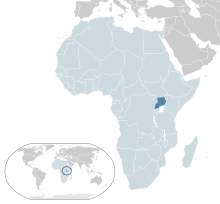History of the Jews in Uganda

| Part of a series on |
| Jews and Judaism |
|---|
| History of Uganda | ||||||||||||
|---|---|---|---|---|---|---|---|---|---|---|---|---|
 | ||||||||||||
| Chronology | ||||||||||||
|
||||||||||||
| Special themes | ||||||||||||
|
||||||||||||
| By topic | ||||||||||||
|
| ||||||||||||
The history of the
Abayudaya
The small
British Uganda Programme
The
Modern relations with Israel
In 1972 relations with Israel soured. Although Israel had previously supplied Uganda with arms, in 1972 Idi Amin, enraged over Israel's refusal to supply Uganda with jets for a war with neighboring Tanzania, expelled Israeli military advisers and turned to Libya and the Soviet Union for support.[9] Amin became an outspoken critic of Israel.[1] In the documentary film General Idi Amin Dada: A Self Portrait, he discussed his plans for war against Israel, using paratroops, bombers and suicide squadrons.[10] Amin later stated that Hitler "was right to burn six million Jews".[11]
In June 1976, Amin allowed an
Operation Entebbe
Reactions
Dora Bloch, a 75-year-old British Jewish immigrant, was taken to
The government of Uganda, led by Juma Oris, the Ugandan Foreign Minister at the time, later convened a session of the United Nations Security Council to seek official condemnation of the Israeli raid,[19] as a violation of Ugandan sovereignty. The Security Council ultimately declined to pass any resolution on the matter, condemning neither Israel, nor Uganda. In his address to the council, Israeli ambassador Chaim Herzog said:
We come with a simple message to the Council: we are proud of what we have done because we have demonstrated to the world that a small country, in Israel's circumstances, with which the members of this Council are by now all too familiar, the dignity of man, human life and human freedom constitute the highest values. We are proud not only because we have saved the lives of over a hundred innocent people—men, women and children—but because of the significance of our act for the cause of human freedom.[20][21]
— HERZOG, Chaim.
Israel received support from the Western World for its operation.
UN Secretary General Kurt Waldheim described the raid as "a serious violation of the national sovereignty of a United Nations member state".[25] Dozens of Ugandan soldiers were killed in the raid. The Arab and Communist world condemned the operation calling it an act of aggression.
For refusing to depart (and subsequently leave some of his passengers as hostages) when given leave to do so by the hijackers,
In the ensuing years, Betser and the Netanyahu brothers—Iddo and Benjamin, all Sayeret Matkal veterans—argued in increasingly public forums about who was to blame for the unexpected early firefight which caused Yonatan Netanyahu's death and partial loss of tactical surprise.[27][28]
See also
- Early history of Uganda
- Foreign relations of Israel
- History of Uganda (1962–71)
- History of Uganda (1971–79)
- History of Uganda (1979–present)
- Uganda Protectorate
- United Nations General Assembly Resolution 3379
References
- ^ a b Jamison, M. Idi Amin and Uganda: An Annotated Bibliography, Greenwood Press, 1992, pp.155–6
- ^ Ornstein, Dan (2023-04-02). "For Passover, I sent matzo to the Jews of Uganda. They've given me a gift as well". Goats and Soda. NPR. Retrieved 2023-04-02.
- ^ Harrisberg, Kim (14 April 2014). "The lost Jews of Uganda". Daily Maverick. Archived from the original on 12 September 2017. Retrieved 17 April 2014.
- ^ Shadrach Levi, Mugoya (November 6, 2017). "We Are the Jews of Uganda. This Is Our Story". The Forward. Rachel Fishman Feddersen. Retrieved August 26, 2018.
- ^ Parfitt, Tudor ( Black Jews in Africa and the Americas, Harvard University Press 2013
- ^ "The Uganda Proposal". Jewish Virtual Library. Retrieved 2009-07-08.
- ISBN 0-688-08506-7.
Britain stepped into the picture, offering Herzl land in the largely undeveloped area of Uganda (today, it would be considered an area of Kenya). ...
- ^ Theodor Herzl's biography at Jewish Virtual Library
- JSTOR 1166537.
- ISBN 0-7800-2507-5.
- ^ End for Amin the executioner The Sun-Herald August 17, 2003
- ^ "On this day: July 7th 1976: British grandmother missing in Uganda". BBC. 1976-07-07. Retrieved 2009-08-08.
- ^ Smith, Terence (4 July 1976). "HOSTAGES FREED AS ISRAELIS RAID UGANDA AIRPORT; Commandos in 3 Planes Rescue 105-Casualties Unknown Israelis Raid Uganda Airport And Free Hijackers' Hostages". The New York Times. Retrieved 2009-07-04.
- ^ "Hostage Rescue at the Raid on Entebbe". OperationEntebbe.Com. Retrieved 2009-07-04.
- ^ Middle Eastern terrorism, Mark Ensalaco p. 101 University of Pennsylvania Press, 2007
- ^ a b "Body of Amin Victim Is Flown Back to Israel". New York Times. 4 June 1979, Monday, p. A3.
- ^ Ben, Eyal (3 July 2006). "Special: Entebbe's unsung hero". YNetNews.com. Retrieved 2009-07-04.
- ^ Verkaik, Robert (13 February 2007). "Revealed: the fate of Idi Amin's hijack victim—Crime, UK—The Independent". The Independent. London. Retrieved 2009-07-04.
- ^ Teltsch, Kathleen. "Uganda Bids U.N. Condemn Israel for Airport Raid." New York Times. 10 July 1976. (Section: The Week In Review)
- ^ Herzog, Chaim. Heroes of Israel. p. 284.
- ^ Fendel, Hillel. "Israel Commemorates 30th Anniversary of Entebbe Rescue." Israel National News.
- ^ "Age of Terror: Episode one". BBC News. 16 April 2008.
- ^ "עכשיו, במבצע". 31 March 2008.
- ^ מבצע אנטבה Archived 2011-07-21 at the Wayback Machine
- ^ "July 4, Day of Operation Entebbe, Israel Upgrades Uganda Airport". The Jewish Press. 2013-07-04. Retrieved 2014-07-28.
- ^ Kaplan, David E. "A historic hostage-taking revisited." Archived 2012-01-12 at the Wayback Machine Jerusalem Post. 3 August 2006.
- ^ Sharon Roffe-Ofir "Entebbe's open wound" Ynet, 7 February 2006
- ^ Josh Hamerman "Battling against 'the falsification of history'" Ynet News, 4 February 2007
